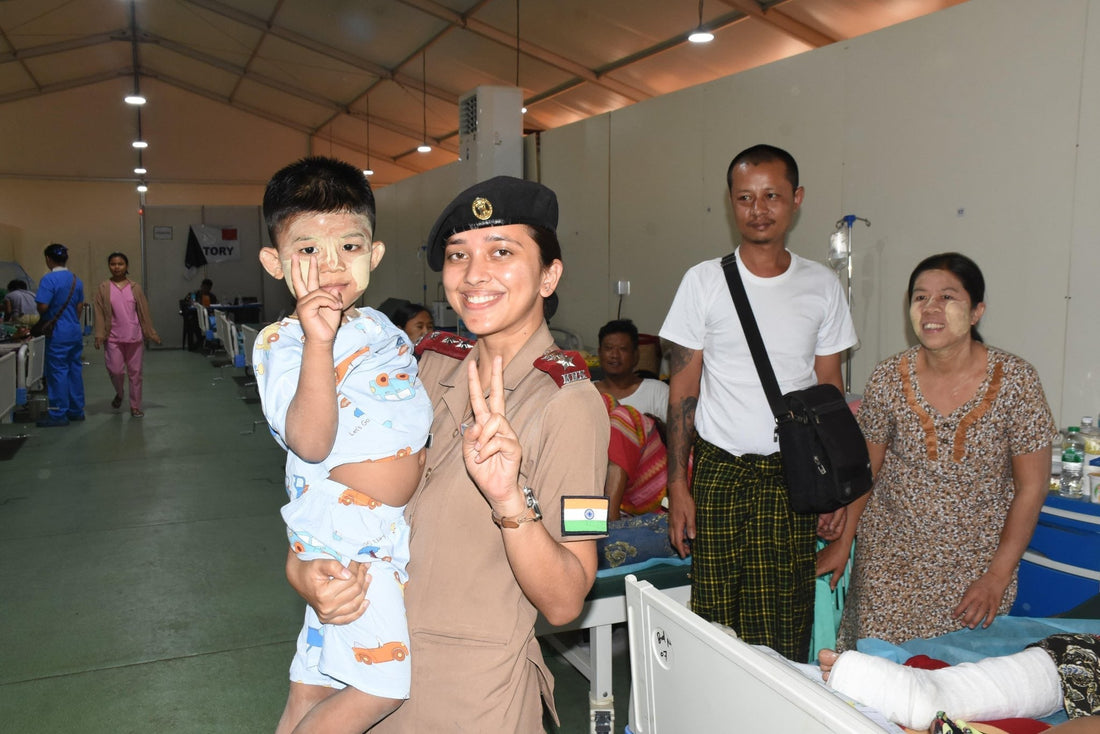Life of an MNS Officer in India

The life of a Military Nursing Service (MNS) officer in India represents a unique confluence of health care, military discipline, and an unwavering commitment to the nation. As integral members of the Indian Armed Forces, these women face the dual challenge of maintaining high standards of medical care while adhering to military protocols, often in situations where lives hang in the balance.
This article explores the multifaceted life of an MNS officer—from their storied history and extensive training to their professional responsibilities, financial compensation, challenges, and contributions to the Armed Forces.
Historical Context
The Military Nursing Service, which serves as a beacon of nursing professionalism in India, has roots dating back to the early 20th century. It formally came into existence in 1926 when the Indian Military Nursing Service (IMNS) was established to cater to the healthcare needs of the British Indian Army. Post-independence in 1947, the service was renamed to the Military Nursing Service (MNS) to reflect India's sovereignty.
Over the years, the MNS has evolved dramatically, with its officers playing critical roles in myriad military and humanitarian efforts, both domestically and internationally. Historical milestones include their active participation in World War II, where MNS nurses served bravely on the frontlines, often under extreme conditions. The changing role of women in the military further underscored the significance of the MNS, breaking gender barriers in the Indian Armed Forces and setting the stage for future generations.
Role and Responsibilities of MNS Officers
MNS officers have a range of responsibilities that are vital for the overall health and well-being of military personnel and their families. Let’s examine these in detail:
Comprehensive Healthcare Services
- Preventive Care: MNS officers conduct regular health check-ups, vaccination drives, and health education programs for soldiers and their families.
- Emergency and Critical Care: In field hospitals or during combat situations, MNS officers render immediate life-saving interventions, manage trauma cases, and facilitate evacuations.
- Family Medical Care: Beyond serving soldiers, MNS officers provide essential health services to the families of personnel, ensuring they receive care in military health facilities.
Medical Research and Training
Apart from direct patient care, MNS officers contribute to medical research aimed at improving healthcare protocols and practices. They also play a significant role in training new nurses and medical personnel, thereby shaping the future of military healthcare.
Disaster Management Operations
Their training equips MNS officers to handle various crises, including natural disasters and warfare, enabling them to respond effectively in emergencies.
SSB Interview Books Power Pack: 4 Must Read Books for Defence Aspirants
Rs. 1,760.00
Sale price
Rs. 1,399.00
Let's Crack SSB Interview Book [Paperback]
Rs. 390.00
Sale price
Rs. 360.00
Breaking The Code of SSB Psychological Tests Book - SSB Interview (TAT/WAT/SRT/SD)
Rs. 390.00
Sale price
Rs. 360.00
OIR Test & PPDT Book - SSB Interview Screening Test - Stage 1 Testing
Rs. 490.00
Sale price
Rs. 375.00
Eligibility Criteria for Becoming an MNS Officer
Joining the MNS is a rigorous process, ensuring that only the most qualified candidates serve this vital role in the Indian Armed Forces. The eligibility criteria include:
- Nationality: Candidates must be Indian citizens.
- Age Requirements: The age range is between 21 to 35 years.
- Educational Qualifications: A B.Sc. Nursing degree from a recognized institution, along with registration with the State Nursing Council, is mandatory.
- Marital Status: Only unmarried female candidates are eligible for entry into the MNS.
- Physical Standards: Candidates must meet specific physical requirements including height, weight, and vision capabilities.
Training Process for MNS Officers
Selected candidates undergo an intensive four-year training program at the Armed Forces Medical College (AFMC) based in Pune. This program includes:
- Academic Training: Comprehensive coursework in various medical subjects, nursing theory, and practice, preparing candidates for their future roles.
- Practical Training: Hands-on experience in military hospitals, learning real-life emergency nursing, and gaining exposure to diverse medical cases.
- Military Training: Exposure to military life, including physical training, weapons training, and military drills, instilling a strong sense of discipline and teamwork.
Career Structure and Ranks Within MNS
Upon successful completion of training, MNS officers are commissioned as Lieutenants. The career progression generally follows this structure:
- Lieutenant
- Captain
- Major
- Lieutenant Colonel
- Colonel
- Brigadier
- Major General
Advancement in rank correlates with increased responsibilities, leadership roles, and opportunities to take on specialized duties.
Financial Compensation and Benefits
MNS officers receive a competitive salary structure along with a range of benefits that reflect their dedicated service. The pay scales are as follows:
- Lieutenant: Rs. 56,100 plus amenities
- Captain: Rs. 61,100 plus amenities
- Major: Rs. 69,400 plus amenities
- Lieutenant Colonel: Rs. 1,21,200 plus A-grade amenities
- Colonel: Rs. 1,30,600 plus A-grade amenities
- Brigadier: Rs. 1,19,700 plus A-grade amenities
- Major General: Rs. 1,44,200 plus A-grade amenities
In addition to their base salary, MNS officers receive various allowances, including travel allowances, dearness allowances, and military service pay. Free accommodation, health care facilities, and retirement benefits further sweeten the deal, making it a lucrative career option.
Professional Responsibilities and Ethical Standards
The ethical framework within which MNS officers operate is paramount. Their responsibilities include:
- Setting Standards: As commissioned officers, MNS officers are expected to uphold and promote high ethical and professional standards in nursing.
- Collaboration: They frequently work alongside physicians and other healthcare professionals, making teamwork essential in ensuring comprehensive care.
- Advocacy: MNS officers act as patient advocates, ensuring that all individuals receive excellent care, irrespective of their military rank.
Work Environment and Challenges
MNS officers often find themselves in some of the most challenging healthcare environments, particularly during deployments in conflict zones or disaster areas. Here’s a deeper look at the conditions they face:
- Physical and Emotional Stress: The nature of their work often involves dealing with trauma, injury, and sometimes loss of life, adding emotional strain.
- Long Duty Hours: Duty schedules can be intense, involving long hours that require immense physical and mental stamina. Officers may be on duty for 14 days at a stretch, with little downtime.
Specialized Training and Continued Education Opportunities
MNS officers are encouraged to pursue specialized training to advance their skills. This includes:
- Postgraduate Studies: Options for further education such as MSc in Nursing or PhD programs.
- Specialized Courses: Training in areas like critical care nursing, emergency nursing, and disaster management nursing is highly encouraged, enhancing their expertise and capabilities.
Recognition and Contributions
MNS officers have been pivotal during numerous military operations and humanitarian missions. Their contributions have not gone unnoticed. They are recognized as equal partners with other commissioned officers in the Indian Army and enjoy the same privileges and respect.
Real-World Contributions
- Peacekeeping Missions: MNS officers have played crucial roles in United Nations peacekeeping efforts where they provided medical assistance in war-torn regions.
Challenges and Proposed Solutions
Like any profession, the life of an MNS officer comes with its unique set of challenges. Addressing these requires transparency and proactive measures from the system.
Key Challenges:
- Work-Life Balance: The demanding nature of their jobs often leads to insufficient time for personal life and self-care.
- Mental Health: Continuous exposure to high-pressure environments can lead to burnout and mental health issues.
Proposed Solutions:
- Counseling Services: Regular psychological support and counseling should be offered to help manage stress.
- Flexible Duty Hours: Instituting more flexible schedules can aid officers in achieving a healthier work-life balance.
Future Trends and Predictions
As the MNS continues to evolve, several trends are likely to shape its future:
- Increased Recruitment: With the Indian Armed Forces emphasizing the importance of female participation, the recruitment of MNS officers is expected to rise.
- Technological Advancements: The integration of telemedicine and digital health solutions in military healthcare systems may enhance operational efficiency.
- Focus on Diversity: Recruitment policies may gradually adapt to include women from various backgrounds, focusing on merit while ensuring that diversity thrives within the services.
Conclusion
The life of an MNS officer encapsulates a unique blend of dedication, professionalism, and service to the nation. Their roles are not only crucial in maintaining the health of military personnel but also in embodying the values of courage and resilience that define the Indian Armed Forces. As healthcare demands evolve and the military landscape changes, MNS officers are set to play a pivotal role, ensuring that they adapt and respond effectively to the challenges that lie ahead.
For those interested in pursuing this honorable path, resources and training opportunities are essential, and organizations like SSBCrack and SSBCrackExams provide valuable insights and study materials for aspirants.
Through their unwavering commitment, MNS officers not only uplift the standard of military healthcare but also pave the way for future generations of healthcare professionals in the Armed Forces.


![Let's Crack SSB Interview Book [Paperback]](http://shop.ssbcrack.com/cdn/shop/files/ssb-books.webp?v=1736351621&width=533)
























